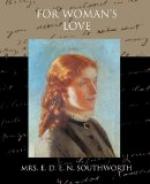Clarence, the second son, was much younger than his elder brother, and so diametrically opposite to him and to their father, both in person and character, that he scarcely seemed to come of the same race.
He was really thirty-five years old, but looked ten years less, and was a fair blonde, medium-sized and plump, with a round head covered with light, curling yellow hair, a round, rosy face as bare as a baby’s and almost as innocent. He had not the satanic intellect of his father or his brother, but he had a fine moral and spiritual nature that neither could understand or appreciate.
There were yet two other exceptions to the family character of worldliness and selfishness. There were Corona and Sylvanus Haught, a sister and brother, orphan grand-children of Aaron Rockharrt, left him by his deceased only daughter. Sylvanus, a fine, manly young fellow, resembled his Uncle Clarence in person and in character, having the same truthfulness, generosity and sincerity, but with a mocking spirit, which turned evil into ridicule rather than into a subject of serious rebuke. He was three years younger than his sister. Corona was a beautiful brunette, tall, like all the Rockharrts, with a superbly developed form, a fine head, adorned with a full suit of fine curly black hair, delicate classic features, straight, low forehead, aquiline nose, a “Cupid’s bow” mouth, and finely curved chin. This was her wedding-day and she wore her bridal dress of pure white satin, with veil of thread lace and wreath of orange buds. Hers was the very triumph of a love match, for she was about to wed one whom she had loved from earliest childhood, and for whom she had waited long years.
Here was Corona Haught’s great victory. She had seen his opponents, her own family, bow down and worship her idol. Yet, at the culmination of her triumph, on this her bridal day, why did she sit so pale and wan?
From her deep, sad reverie she was aroused by the entrance of her six gay bridesmaids.
“Corona, love, good morning! Many happy returns, and so on!” said Flora Fields, the first bridesmaid, coming up to the pale bride and kissing her.
All the others followed the example, and then Miss Fields said:
“Cora, dear, ’the scene is set’—otherwise, the company are all assembled in the drawing-room. Grandpapa and grandmamma are in their seats of honor. The bishop, in his canonicals, is waiting; the groom and his groomsmen are expectant. Are you ready?”
“I know getting married must be a serious, a solemn, even an awful thing when it comes to the point. And most brides do look pale! But you—you look ghastly! Come, take some composing spirits of lavender—do!”
“Yes; you may give me some. You will find the vial on the dressing-table.”
The restorative was administered, and then the “bevy of fair maids” left the chamber and went down stairs.




